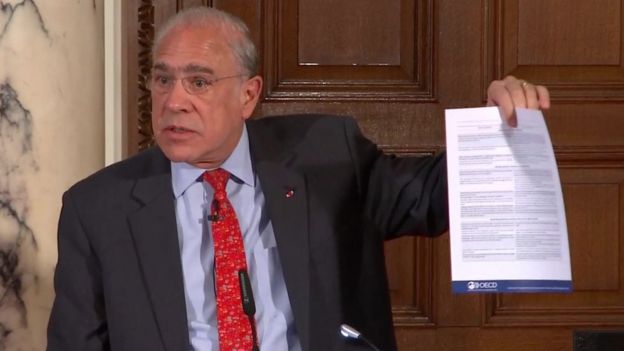The world’s most prominent economic think-tank has spent months crunching the numbers on the prospects for the UK economy and concluded there is one simple strategy to protect its growth – stop Brexit.
Keeping Britain in the EU – through a new referendum or a change of government – would have a “significant” positive impact on growth, according to the 35-nation Organisation of Economic Cooperation and Development.
Bail Out Now
 A report launched by OECD chief Angel Gurria (left with the report) added that the “no deal” Brexit now being advocated by hardline Conservative MPs would be an economic disaster, leading to a freeze of investment, cuts to the UK’s credit rating and the pound plunging to new lows.
A report launched by OECD chief Angel Gurria (left with the report) added that the “no deal” Brexit now being advocated by hardline Conservative MPs would be an economic disaster, leading to a freeze of investment, cuts to the UK’s credit rating and the pound plunging to new lows.
A “no deal” Brexit would also cause higher prices that would “choke off” private consumption at the same time that the country’s dwindling credit rating would probably lift interest rates, according to the grim independent analysis.
Former Tory Cabinet Secretary John Redwood (below) is among Tory MPs urging Prime Minister Theresa May not to be afraid of ending the Brexit negotiations without a deal on Britain’s future trading relations with the EU, with Redwood insisting it would be “perfectly fine” for the UK to end up with no deal.
Redwood’s confidence about the consequences of failing to reach a deal was rejected by the OECD researchers and by a separate report prepared by trade experts at Sussex University and the Resolution Foundation, a think tank run by another former Tory Cabinet Secretary David Willetts.
That report warned that the impact on imports and exports of going ahead with Brexit without first reaching a trade deal would significantly increase the living costs of millions of British households.
The average household would pay £260 a year more for imported goods, with the 3 million households that consume the most imports paying almost twice that figure.
A “no deal” Brexit would see European goods hit by standard World Trade Organisation tariffs, increasing the levies on dairy products by 45% and on meat products by 37%.
Higher Prices
 The OECD said that a “disorderly” departure from the single market and customs union “would hurt trading relationships and reduce long-term growth” and other economic problems for the UK included weak productivity growth.
The OECD said that a “disorderly” departure from the single market and customs union “would hurt trading relationships and reduce long-term growth” and other economic problems for the UK included weak productivity growth.
Sharp falls in the UK’s productivity performance compared to other major economies had left the country in a weak condition to cope with trading outside the single market and third-party trade agreements reached by the 28-nation EU, the OECD said.
Poor productivity, especially in the north of the UK, could have resulted from “important differences among people in terms of income and wealth, jobs and earnings, and education and skills,” the OECD said.
Those differences “may have been one of the causes of Brexit, as less-educated workers in remote regions might have perceived to benefit less from the European project”.
The British Treasury responded to the OECD report by flatly rejecting any suggestion of a referendum on the results of the Brexit negotiations.
“We are leaving the EU and there will not be a second referendum,” the Treasury said in a brief statement hinting at the British Government’s displeasure with the OECD’s intervention.
A prominent German MP suggested on BBC Radio 4’s Today programme that the Prime Minister’s attempts to reach a Brexit deal by making progress on the question of how much of a “divorce bill” Britain would pay were being undermined by her own Foreign Secretary.
Michael Fuchs, the vice chairman of Chancellor Angela Merkel’s Christian Democratic Union party, said Boris Johnson clearly had his own agenda on the issue.
“I know there are internal problems, whatever she is offering, Boris Johnson is saying it’s too much,” he said.
“I don’t know what his influence (is), it seems to be pretty strong because otherwise she would come up with other proposals I guess and the problem is she has internal trouble in the Tories.”
by Peter Wilson
The post Brexit: “Call It Off” Says OECD appeared first on Felix Magazine.
No comments:
Post a Comment